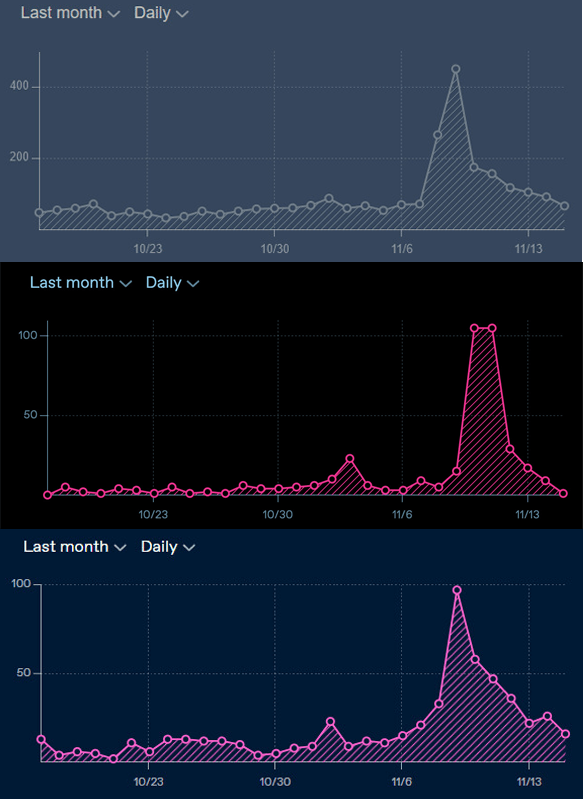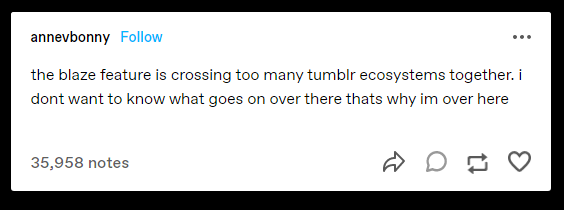I’ve covered Tumblr’s place in the digital ecosystem before, and what makes it unique as a hub for fandoms and other online communities. While it’s not being presented by anyone trustworthy as an alternative to Twitter, there has been a noticeable increase in activity on the site.
A few users who noticed a sharp uptick in followers in the span of a few days in November shared their statistics, showing the same pattern.

The theory behind these spikes has been that the blog contents were often shared on Twitter —via screenshotted posts— and because of that familiarity, they attracted new users as followers. Toastystats, who reshared these statistics and is one of the best statistics keepers of fandom, suggested that these blogs may also have been recommended to new users.
This alone isn’t necessarily indicative of a migration to Tumblr, but even I have noticed an increase in newcomers to the site over the past months. The newbies stand out because they appear with blank blogs and tons of likes and do not engage in the established Tumblr dynamics. Even the spambots have more personality because they’re making an effort to appear real.
I know this is a common concern because of the numerous “Welcome/Guide” posts making the rounds. These attempts to establish a baseline for newcomers, a secondary but ultimately voluntary, terms of service. It’s not gone over well with certain segments of stan Twitter, who have Done Fandom a certain way and aren’t taking kindly to how-tos. This should be a given, but fandom is often treated as a united front, a many-tentacled beast rather than the sum of its parts.
These circulating guides will be seen by more longtime users than newbies; that’s just the nature of the reblog. So they also serve as reminders to the existing users who haven’t been behaving accordingly. I don’t know how effective it’s going to be; I have yet to notice a positive impact.
We may not all have experienced the wreckage of a fandom collapse, but most of us have seen the downward spirals from the outside.
Not all the friction comes from a feared deluge of users, but from the inherent destabilization by web 2.0 and how it’s trained us to interact and maintain online communities. It’s a feature; not a bug. We may not all have experienced the wreckage of a fandom collapse, but most of us have seen the downward spirals from the outside. I’m pretty sure many fandoms are observed for the schadenfreude alone, but it’s hard to see yourself and your mutuals, friends, and extended circles as part of the overall collapse.
The Tumblr downward spiral has been ongoing for quite some time, each speed bump escalating general anxieties. One of the best elaborations as to how fandom was harmed by web 2.0 comes from Mikkeneko and Freedom-of-fanfic —I don’t want to regurgitate their stances, but the most important part to me is the unique landscape of the site. It’s a borderless tundra with self-imposed, imaginary, mise-en-scène. My favourite visual representation remains Lars von Trier’s Dogville.
What all this amounts to in present day? In basic terms: part of the problem has been reduced engagement.
While it’s easy to assume that complaints over diminishing returns are a sign of entitlement, it really is essential to the way the site works without algorithms. Hedgehog-moss pointed out that content circulation was in the domain of users rather than algorithms, and the lack of engagement from fellow users means a decline in circulation, and maybe a new reliance on the very algorithms that ruin other sites.
Another problem is the unfounded belief that Tumblr has escaped the grips of corporatism; no meddling, just authenticity. It shouldn’t be a surprise that Tumblr was “infiltrated” long ago. It wasn’t even that duplicitous—everything is public, after all? What’s the harm in the writers of Euphoria catfishing fandom?
The attempts of fandom and other Tumblr users to fight back against corporate influence have been for naught. After all, Tumblr remains a company, with fiscals and EBITDAs, and they have worked hard on increasing income.
Ad-free browsing was one implementation that didn’t move the needle much, the new Blaze feature, however, has been put to use by many. It’s the equivalent of promoting a Tweet to appear on others’ timelines; a blazed post will blast across Tumblr, cutting through all invisible borders.
Blaze has also been used by official accounts, leading to a rallying cry against the Adpocalypse, urging users not to interact with corporate accounts. Starve them out, if you can. This approach is expected, particularly on Tumblr, what I didn’t see coming was the turn where corporatism was seen as a positive— The Answer to keep Tumblr afloat without descending into an algorithmic hellscape (derogatory) instead of remaining a self-curated hellscape (affectionate).
As I’ve mentioned before, users have celebrated devaluing the site because it meant we remained ungovernable. But users are now pointing out that this is a recipe for the site to disappear entirely. It’s a new perspective, for me, and I can’t help but wonder if it’s connected to the ongoing Twitter panic. Suddenly it seems possible, perhaps even likely, that a site you’ve come to rely on, where your communities are, might disintegrate into black holes in front of us.
Whether the Blaze feature itself is a step towards profitability remains unknown; it’s being used, I can confirm that from my own experiences on the dashboard. Whether Blazing a post is profitable for the user themselves, that’s another question.
User elodieunderglass conducted a blaze experiment and shared the statistics she received. Her conclusion was the Blaze was “less effective (for me) than just posting.” With a total of approximately 22 thousand followers, the blazed post reached farther through that existing network passing it on, displaying it to others.
These monetization efforts have been ongoing for quite some time now, something brand new that was developed in response to Twitter? Double checkmarks.
Any blog can now acquire Important Blue Internet Checkmarks, two of them, for the low price of 7.99! It’s a much better deal than Twitter is offering, and it’s an unlimited resource. You could get a dozen Important Blue Internet Checkmarks attached to your blog name, as long as they’ve been paid for.
Tumblr being Tumblr, the implementation of this feature was less than perfect. Turns out that the checkmarks were not visible on mobile, which many users opt for entirely.
This type of half-assed update is completely on brand for Tumblr, and as the screenshot above suggests, it’s all a matter of laughing it off. Will it be fixed? Who knows, plenty of people have bought into the checkmarks as is; only seeing them on web can’t matter that much. Surely working on producing and shipping out those bluecheck products is a bigger priority than revising some faulty code, right?











I think that any company or space that feels like it's required to dunk on another company or space immediately places themselves in the inferior position. Reeks of insecurity.
I'm interested to see what happens with my own adventures back on Tumblr. Good post as always!